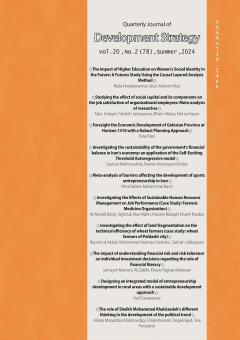The role of Sheikh Mohammad Khalsizadeh's different thinking in the development of the political trend
Subject Areas :ALIREZA MOQADDASI Mahmoudjig 1 , sina forouzesh 2 * , Gholamhossein Zargarinejad 3
1 - PhD student of Islamic history, Tehran Science and Research Unit, Islamic Azad University, Tehran, Iran
2 - Associate Professor of the Faculty: Literature, Humanities and Social Sciences
3 - Professor, Department of History, Science and Research Unit, Islamic Azad University, Tehran, Iran
Keywords: Keywords: political innovation, Sheikh Mohammad Khalsizadeh, Naqsh, alternative thought movement, political reform.,
Abstract :
Alireza Moqaddasi Mahmoudjig Gholamhossein Zargarinejad Sina Forouzesh Abstract Among the religious and social reformer religious scholars, we can mention Sheikh Mohammad Khalsizadeh, who is mentioned in this article. He is under the influence of culture and thought. More or less modern after the constitution and especially inspired by reform and social changes. It was the era of Reza Shah Pahlavi and after that.Paradoxically, on the one hand, he was against the changes and reforms of Reza Shahi, and often also The tool of religion and preserving the sanctity of your religion and Sharia to confront the modernization of the government. On the other hand, he was directly and indirectly under the influence of the same modern (or semi-modern) terms. by resorting to the creation of neoideological works and dealing with important issues such as demystifying the official readings of the clerics of his time, the position of women, the religious pathology of society, the etiology of degeneration, the backwardness of Iranians, the relationship between religion and modernity, the connection between religion and wisdom And other approaches that were in some way in the orbit of religious reformation, are among the first reformers and thinkers of contemporary religious new thinking.In this research, we are looking for what conditions influenced thinkers like Khalasizadeh, or what mechanisms and elements were the basis of this intellectual transformation in their thought.
- احمدی، علی.(١٣٨٣). شیخ محمد خالصی زاده (روحانیت در مصاف با انگلیس)، تهران: مرکزاسناد انقلاب اسلامی.
- اصغری نژاد، محمد. (١٣٧٣). محمدمهدی خالصی خصم استعمار. قم: مرکز چاپ و نشر سازمان تبلیغات اسلامی.
- الرهیمی، عبدالحلیم.(١٣٩٠). تاریخ جنبش های اسلامی در عراق ١٩٢٤ – ١٩٠٠. ترجمه جعفر دلشاد. قم: بوستان کتاب.
- بهار، محمد تقی. (١٣٢٣). تاریخ مختصر احزاب سیاسی ایران. جلد ١. تهران: امیر کبیر.
- پالمر، رابرت روز ول.(1389). تاریخ جهان نو. جلد 2. ترجمه ابولقاسم طاهری. تهران: امیر کبیر.
- حائری، عبدالهادی (١٣٦٠). تشیع و مشروطیت در ایران و نقش ایرانیان مقیم عراق. تهران: امیرکبیر.
- خالصی زاده، محمد. (١٣٨٦). «مظالم انگلیس در بین النهرین، در رسائل سیاسی آیت اﷲ شیخ محمد خالصی زاده. ترجمه اسلام دباغ. تهران: مرکز اسناد انقلاب اسلامی.
- ........... (١٣٨٦). «نبرد مسلحانه مراجع با انگلیس؛ خاطرات میدانی آیت اﷲ شیخ محمد خالصی زاده». ترجمه عبدالحسین مدنی و سمیه گودرزی. فصلنامه مطالعات تاریخی. شماره نوزدهم. صص 71-10.
- ....... (١٣٢٣). کشف الاستار(پاسخ به کتابخانه اسرار هزار ساله). بی جا: محمد حسین محمدی اردهالی.
- ......... (١٣٤٤)، آیا اینان مسلمانند (وصیت نامه خالصی زاده). ترجمه حیدر علی قلمداران. بی جا: نشر حسنعلی حدادی.
- .......... (١٣٨٨). سردار اسلام شهید آیت اﷲ العظمی شیخ محمد مهدی خالصی. ترجمه امیر سلیمانی رحیمی. تهران: مرکز اسناد انقلاب اسلامی.
- ............. (١٣٨١). «توحید کلمه، وحدت ملی، ایران اداره نمی شود مگر به اجرای قوانین اسلام». در چالش مدرنیسم و مذهب. سیر اندیشه های سیاسی- مذهبی در ایران نیمه اول قرن بیستم. مسعود کوهستانی نژاد. تهران: نشر نی.
- دباغ، اسلام. (١٣٩٠). مبارزات آیت اﷲ شیخ محمد خالصی زاده به روایت اسناد. تهران: مرکز اسناد انقلاب اسلامی.
- لوئیس، برنارد (١٣٩١)، خاورمیانه؛ دو هزار سال تاریخ از ظهور مسیحیت تا امروز. ترجمه حسن کامشاد. تهران: نشر نی.
- مستوفی، عبدالله. (1384). شرح زندگانی من. جلد 3. تهران: انتشارات خیام.

